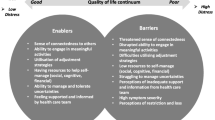Abstract
Purpose
We sought to explore the symptomatic experience of men recently told their castration-resistant prostate cancer has metastasized (mCRPC); the impact and emotional response to this; the emotional burden of monitoring development to metastatic status; and the emotional impact on the primary support person (PSP).
Methods
Interviews were conducted with 25 men recently diagnosed with mCRPC from the United States (US), France, and Germany. We also interviewed 14 PSPs. Thematic analysis was conducted using Atlas.ti.
Results
The mean age of patients was 72.2 years; mean time since metastasis 7.8 months. The most frequent symptoms were fatigue/tiredness, sexual dysfunction, and pain. Metastasis had a negative emotional impact on the patient and PSP. Some explicitly associated certain symptoms/impacts with metastasis, such as localized pain, diarrhea, blood in stool, and increased impact on activities of daily living. About 72% of patients highlighted the emotional impact of a metastatic diagnosis, reporting worry/anxiety/fear, low mood/depression, shock, increased burden on PSP, and strain on relationships. Monitoring prostate-specific antigen (PSA) values was important; ten patients explicitly discussed feeling fear/worry when PSA was rising, and glad/happy/excited when PSA was falling. Most reported that, if a medication had been available to them to delay metastasis, they would have taken it, even if they were asymptomatic.
Conclusions
Interviews highlighted the substantial burden of mCRPC to both patient and PSP. Development of metastasis was associated with symptoms worsening rather than the development of new symptoms, with physical and emotional impacts. Most patients were willing to take a medication to delay metastasis.

Similar content being viewed by others
References
Bray F, Ferlay J, Soerjomataram I, Siegel RL, Torre LA, Jemal A (2018) Global cancer statistics 2018: GLOBOCAN estimates of incidence and mortality worldwide for 36 cancers in 185 countries. CA Cancer J Clin 68(6):394–424. https://doi.org/10.3322/caac.21492
National Cancer Institute. Cancer stat facts: prostate cancer (2019) At https://seer.cancer.gov/statfacts/html/prost.html. Accessed June 11, 2019
Siegel RL, Miller KD, Jemal A (2019) Cancer statistics, 2019. CA Cancer J Clin 69(1):7–34. https://doi.org/10.3322/caac.21551
Kirby M, Hirst C, Crawford ED (2011) Characterising the castration-resistant prostate cancer population: a systematic review. Int J Clin Pract 65(11):1180–1192. https://doi.org/10.1111/j.1742-1241.2011.02799.x
Nussbaum N, George DJ, Abernethy AP, Dolan CM, Oestreicher N, Flanders S, Dorff TB (2016) Patient experience in the treatment of metastatic castration-resistant prostate cancer: state of the science. Prostate Cancer Prostatic Dis 19(2):111–121. https://doi.org/10.1038/pcan.2015.42
American Urological Association. Castration-resistant prostate cancer (2018) At https://www.auanet.org/guidelines/prostate-cancer-castration-resistant-guideline#x1929. Accessed June 11, 2019
Weinfurt KP, Li Y, Castel LD, Saad F, Timbie JW, Glendenning GA, Schulman KA (2005) The significance of skeletal-related events for the health-related quality of life of patients with metastatic prostate cancer. Ann Oncol 16(4):579–584. https://doi.org/10.1093/annonc/mdi122
Klotz L, Vesprini D, Sethukavalan P, Jethava V, Zhang L, Jain S, Yamamoto T, Mamedov A, Loblaw A (2015) Long-term follow-up of a large active surveillance cohort of patients with prostate cancer. J Clin Oncol 33(3):272–277. https://doi.org/10.1200/JCO.2014.55.1192
Clark MJ, Harris N, Griebsch I, Kaschinski D, Copley-Merriman C (2014) Patient-reported outcome labeling claims and measurement approach for metastatic castration-resistant prostate cancer treatments in the United States and European Union. Health Qual Life Outcomes 12:104–114. https://doi.org/10.1186/s12955-014-0104-5
Smith MR, Saad F, Chowdhury S, Oudard S, Hadaschik BA, Graff JN, Olmos D, Mainwaring PN, Lee JY, Uemura H, Lopez-Gitlitz A, Trudel GC, Espina BM, Shu Y, Park YC, Rackoff WR, Yu MK, Small EJ, Investigators S (2018) Apalutamide treatment and metastasis-free survival in prostate cancer. N Engl J Med 378(15):1408–1418. https://doi.org/10.1056/NEJMoa1715546
Braun V, Clarke V (2006) Using thematic analysis in psychology. Qual Res Psychol 3(2):77–101
World Medical Association (2001) Declaration of Helsinki. Ethical principles for medical research involving human subjects. Bull World Health Organ 79(4):373–374
Acknowledgments
Editorial assistance under the authors’ guidance was provided by Drs Shirley Samuel and Amlan RayChaudhury, Clinical Outcomes Solutions (Chicago, IL, USA).
Funding
Funding for this study was provided by Janssen.
Author information
Authors and Affiliations
Corresponding author
Ethics declarations
All study documents were submitted and approved by the ethics boards in each country. The study was performed in accordance with the Declaration of Helsinki and US 21 Code of Federal Regulations [12]. All participants (men with mCRPC and their PSPs) provided written informed consent and received a small stipend for their participation. Recruiting physicians also received reimbursement for each participant recruited.
Conflict of interest
CB, JAR, and TS are employees of Clinical Outcomes Solutions, which received funding from Janssen to perform this study. JL, LD, ALG, BE, and KM are employees of Janssen Global.
Additional information
Publisher’s note
Springer Nature remains neutral with regard to jurisdictional claims in published maps and institutional affiliations.
Rights and permissions
About this article
Cite this article
Burbridge, C., Randall, J.A., Lawson, J. et al. Understanding symptomatic experience, impact, and emotional response in recently diagnosed metastatic castration-resistant prostate cancer: a qualitative study. Support Care Cancer 28, 3093–3101 (2020). https://doi.org/10.1007/s00520-019-05079-3
Received:
Accepted:
Published:
Issue Date:
DOI: https://doi.org/10.1007/s00520-019-05079-3




